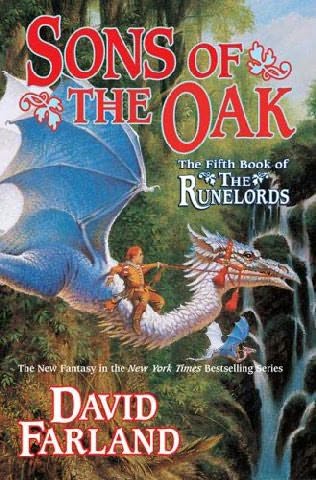
This is the fifth book in the Runelords series. One of those long drawn out fantasy epics. Thousands and thousands of pages, filled with far flung mythical ideas to make the mind escape into another world...which I guess is the point of most fantasy books? I'm going to throw a big disclaimer in here - This book is very far flung fantasy, maybe even 'hardcore' fantasy would be a good descriptions. I'll justify this point by giving you a quick rundown of the story; the Earth King dies, the evil demon Shadoath is back, the Son is a fireweaver, the forcibles are in sort supply, old souls are being reincarnated...'nuff said? To stress my previous point, you have to be really into fantasy to appreciate this one.
Luckily, I am into 'hardcore' fantasy. So, this book was a page turner for me.
You really need to read the first four books of the Runelords to get the full experience that is offered up in Sons of the Oak. If you recall, the previous books centred around a guy named Gaborn. This seemingly regular guy's destiny was to become the Earth King, which meant he could use the powers of nature to defeat evil. As I stated earlier - a far flung fantasy. Sons of the Oak turns the page on the Earth King novels and enters a new chapter, the life of his sons.
What big shoes those sons have to fill! If your father was the Earth King, the guy who saved the world from an eternity of darkness, how can you ever live up to that? This book explores that question. The books begins with a big battle scene. A gruesome extremely detailed battle scene. One, that even disturbed me...when there is descriptions of brains hanging out of heads, that are stuck to some knight's lance..that disturbs me a bit. After this action packed beginning the majority of the book is your typical journey/discovery story (I call it). You know? One of the characters journey halfway around the world to end up fighting the heartless, souless, evil villain. Along the way they discover their hidden mystical power, and eventually accept that it is their destiny to battle evil. In this case Fallion, the Earth King's first born, journeys to 'the ends of the earth' in an attempt to escape death. Along the way he discovers he can control fire. Luckily for him fire brings light, and evil heartless villians are controlled by 'darkness'...you can guess the ending by where I'm going here.
Even though many of the fantasy books I've read have very similar stories they never seem to get old. Take a look at the infamous fifty year old classic The Lord Of The Rings. What happens in this book? A young hobbit journeys halfway around the world and on the way there realizes he has some mystical power (in this case the ring) and that his destiny is to fight the darkness.
What makes this book different? There is an idea Farland calls 'endowments', where a mixture of magic and metal is used to transfer traits from one person to another. People can give up things like strengh, endurance, beauty, eyesight to another. The person taking these endowments can then have double the strength or double the eyesight of the common man. They are then called Runelords, hence the name of the book series. The good and bad points of endowments are examined in the books. Obviously there are some good points, like you can 'make' a super warrior to defend your kingdom. But, there are so many negative aspects. What happens to the people who give up their traits? Who cares for them? How far will someone go to get endowments...from children?
Overall, this book had a great story, lots of deeper ideas/theories to leave you pondering late into the night, some really gruesome scenes (if that is what you are into?), and best of all an ending that leaves you hanging...because there are more books! Gotta love finding a good series that has book after book.
RATING : READ


